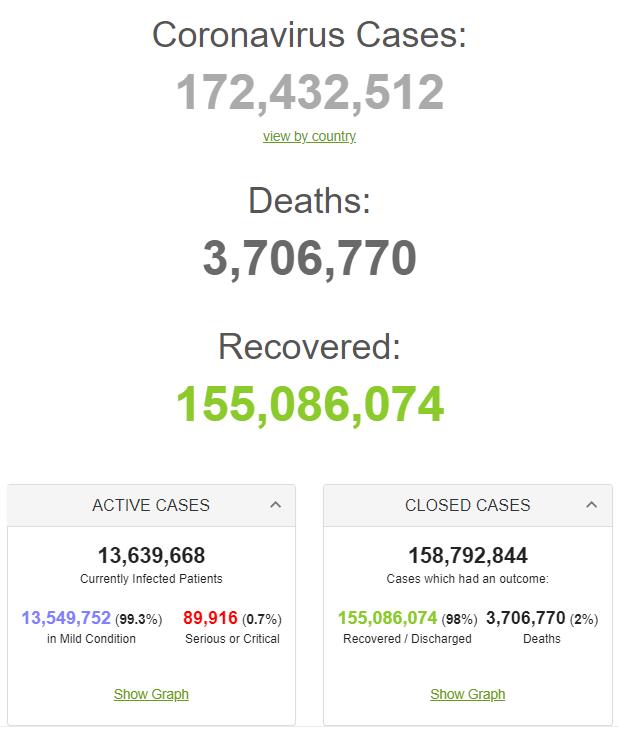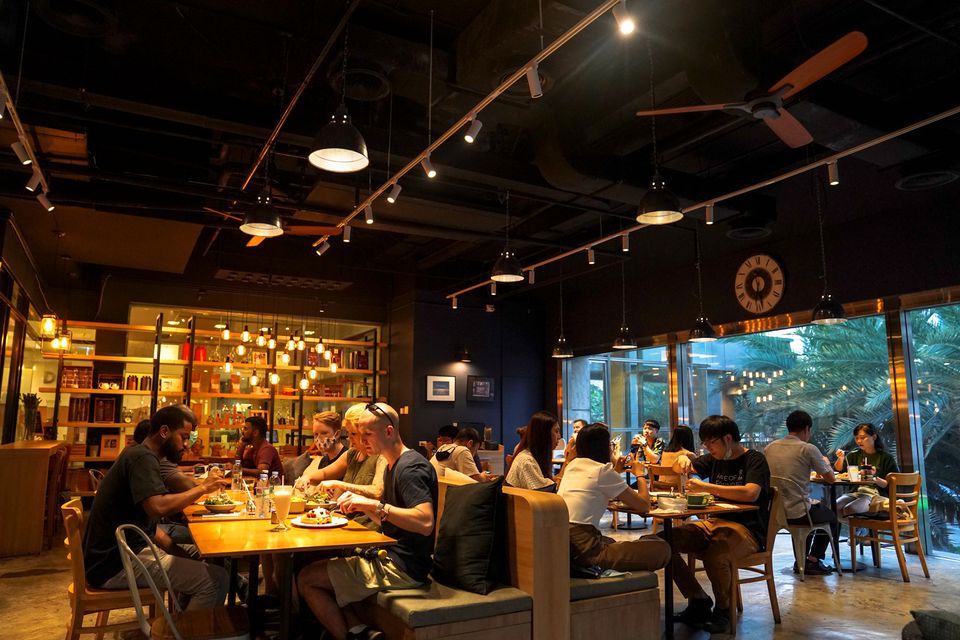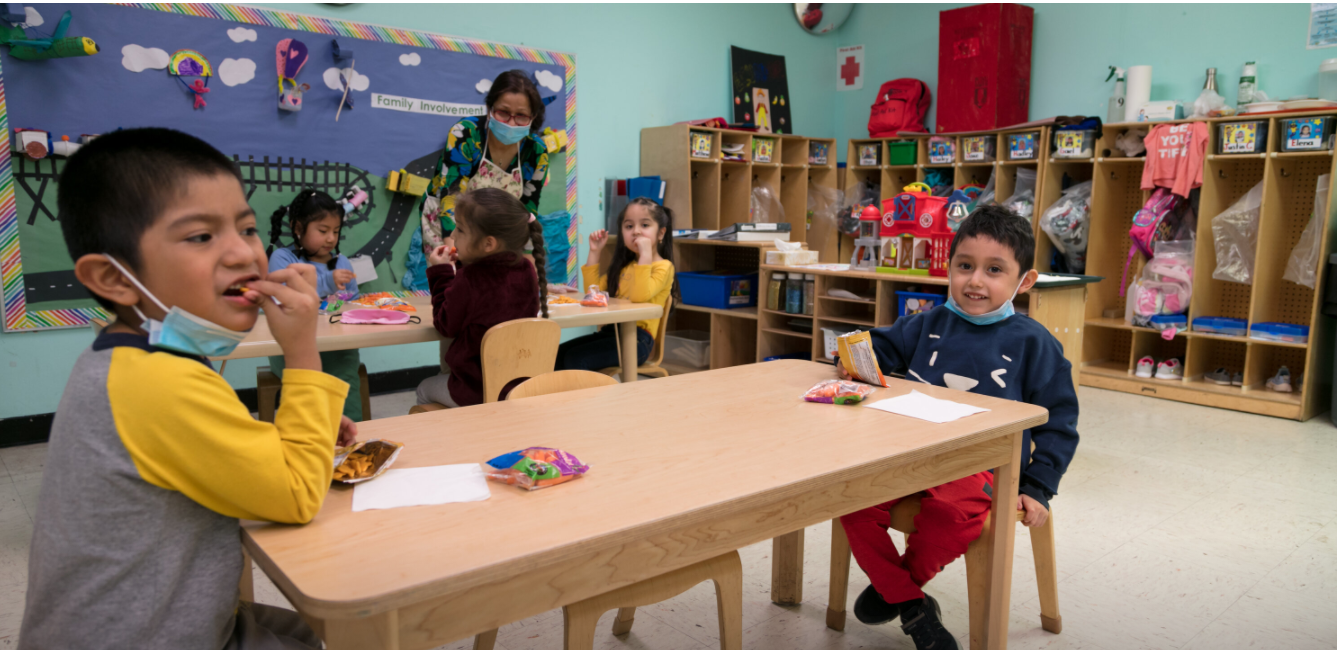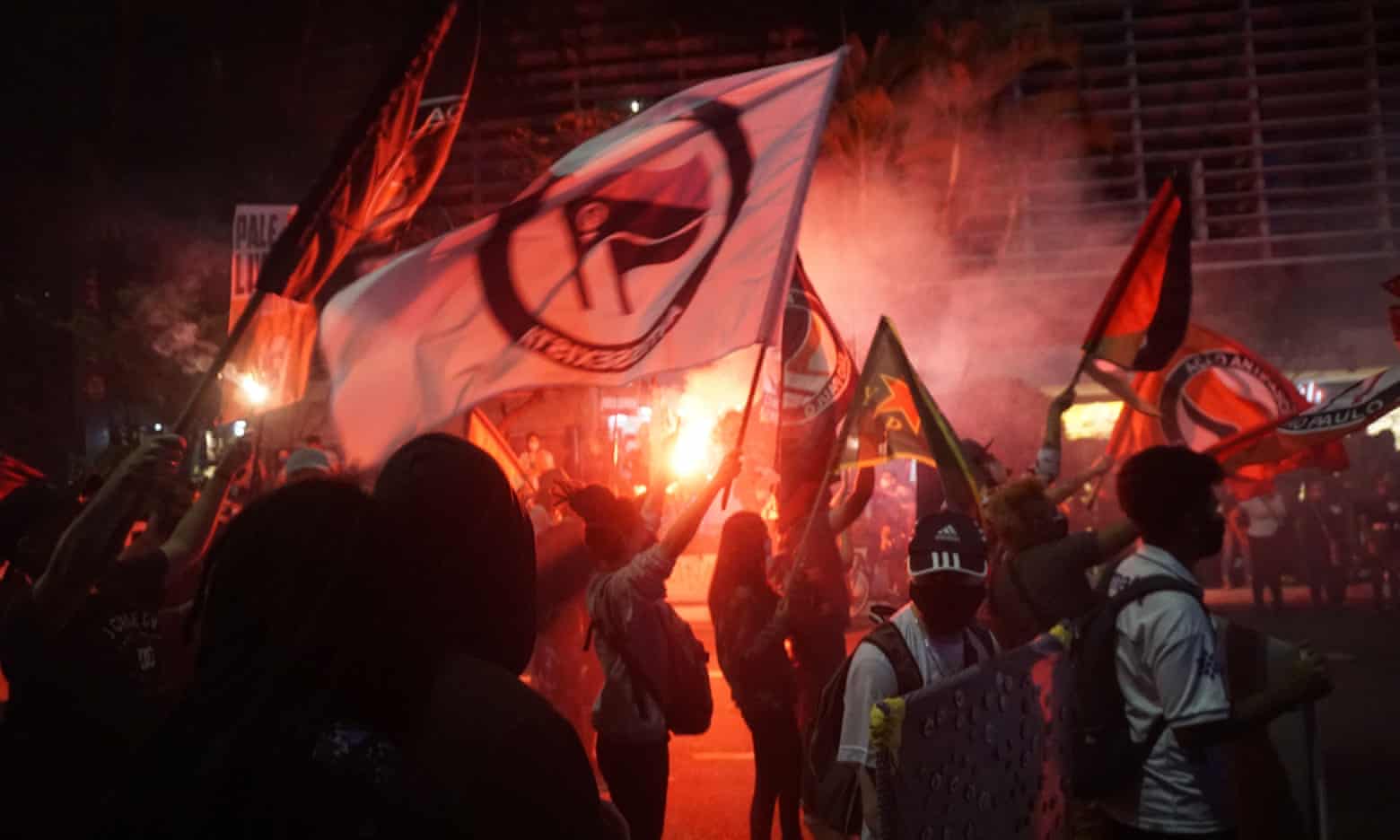
 i_need_contribute
i_need_contribute


|
Country, |
Total |
New |
Total |
|
World |
172,407,356 |
+489,890 |
3,705,990 |
|
34,154,305 |
+16,974 |
611,020 |
|
|
28,440,988 |
+134,105 |
338,013 |
|
|
16,720,081 |
+94,509 |
467,706 |
|
|
5,685,915 |
+8,743 |
109,758 |
|
|
5,263,697 |
+7,181 |
47,768 |
|
|
5,090,249 |
+8,832 |
122,267 |
|
|
4,494,699 |
+4,330 |
127,794 |
|
|
4,223,200 |
+2,897 |
126,283 |
|
|
3,852,156 |
+35,017 |
79,320 |
|
|
3,698,004 |
+5,096 |
89,510 |
|
|
3,687,762 |
+4,984 |
80,049 |
|
|
3,459,422 |
+27,000 |
89,808 |
|
|
2,935,443 |
+11,620 |
80,488 |
|
|
2,873,527 |
+664 |
73,984 |
|
|
2,420,659 |
+6,917 |
227,840 |
|
|
2,206,836 |
+2,205 |
50,857 |
|
|
1,965,432 |
+4,345 |
184,942 |
|
|
1,831,773 |
+5,246 |
50,908 |
|
|
1,675,013 |
+5,782 |
56,711 |
|
|
1,662,256 |
+475 |
30,126 |
|
|
1,654,282 |
+2,502 |
17,644 |
|
|
1,394,973 |
+5,616 |
29,385 |
|
|
1,385,278 |
+2,063 |
25,612 |
|
|
1,240,716 |
+5,257 |
21,158 |
|
|
1,210,105 |
+4,583 |
16,436 |
|
|
1,078,142 |
+164 |
30,415 |
|
|
1,063,499 |
+1,498 |
24,968 |
|
|
924,667 |
+1,843 |
20,930 |
|
|
850,262 |
+724 |
17,026 |
|
|
839,517 |
+6 |
6,415 |
|
|
804,987 |
+275 |
29,774 |
|
|
804,293 |
+1,988 |
12,694 |
|
|
749,130 |
+2,642 |
13,140 |
|
|
737,888 |
+604 |
9,489 |
|
|
712,989 |
+287 |
6,881 |
|
|
645,552 |
+400 |
10,621 |
|
|
587,165 |
+7,703 |
2,993 |
|
|
574,958 |
+2,154 |
1,686 |
|
|
571,111 |
+4,524 |
7,555 |
|
|
540,844 |
+214 |
7,740 |
|
|
520,028 |
+418 |
9,160 |
|
|
452,956 |
+1,269 |
7,393 |
|
|
428,865 |
+1,175 |
20,681 |
|
|
419,010 |
+197 |
17,747 |
|
|
405,542 |
+1,379 |
12,145 |
|
|
395,990 |
+915 |
2,871 |
|
|
389,990 |
+124 |
12,366 |
|
|
388,991 |
+1,319 |
3,974 |
|
|
379,506 |
+678 |
6,381 |
|
|
374,718 |
+3,439 |
14,639 |
|
|
361,440 |
+3,196 |
9,396 |
|
|
356,829 |
+432 |
8,042 |
|
|
348,911 |
+1,925 |
12,793 |
|
|
346,150 |
+954 |
4,834 |
|
|
334,288 |
+156 |
4,926 |
|
|
323,598 |
+2,319 |
4,098 |
|
|
311,846 |
+1,345 |
1,779 |
|
|
309,036 |
+304 |
3,507 |
|
|
301,524 |
+3,518 |
4,394 |
|
|
283,089 |
+954 |
2,516 |
|
|
275,198 |
+415 |
4,283 |
|
|
272,036 |
+246 |
4,178 |
|
|
264,557 |
+951 |
15,178 |
|
|
262,726 |
+407 |
4,941 |
|
|
257,167 |
+1,334 |
8,214 |
|
|
255,285 |
+44 |
6,120 |
|
|
254,419 |
+374 |
4,380 |
|
|
244,726 |
+1,936 |
1,031 |
|
|
238,820 |
+593 |
6,379 |
|
|
236,755 |
+1,188 |
2,674 |
|
|
222,870 |
+92 |
4,446 |
|
|
219,529 |
+1,258 |
2,370 |
|
|
217,882 |
+194 |
562 |
|
|
192,547 |
+3,306 |
1,566 |
|
|
186,323 |
+251 |
3,131 |
|
|
171,226 |
+142 |
3,206 |
|
|
166,560 |
+26 |
2,099 |
|
|
165,462 |
+3,440 |
1,107 |
|
|
155,345 |
+43 |
5,429 |
|
|
144,514 |
+1,191 |
977 |
|
|
143,823 |
+72 |
3,218 |
|
|
141,476 |
+677 |
1,965 |
|
|
133,866 |
+348 |
2,386 |
|
|
132,351 |
+14 |
2,451 |
|
|
129,804 |
+130 |
1,259 |
|
|
129,640 |
+322 |
3,490 |
|
|
125,929 |
+353 |
785 |
|
|
105,469 |
+358 |
1,821 |
|
|
100,726 |
+231 |
691 |
|
|
99,683 |
+31 |
1,587 |
|
|
96,563 |
+742 |
1,284 |
|
|
72,573 |
+58 |
361 |
|
|
15,428 |
+300 |
316 |
|
|
7,813 |
+241 |
49 |
Retrieved from: https://www.worldometers.info/coronavirus/
Patpicha TanakasempipatAthit Perawongmetha Retuers

Customers eat food inside Chu Chocolate Bar & Cafe before being closed permanently due to the coronavirus disease (COVID-19) pandemic in Bangkok, Thailand, May 29, 2021. REUTERS/Athit Perawongmetha
When restaurant owner Chirayu Na Ranong heard the Thai government announce new coronavirus restrictions in Bangkok in April, he burst into tears.
The latest curbs were the final straw for his Chu Chocolate Bar & Cafe in the centre of the city. The cafe, popular with both tourists and locals for the past decade, closed its doors for the last time this week.
"I knew that it was over, because we were already just barely surviving, and then with one more lockdown, we wouldn't have enough money to pay," Chirayu, 36, told Reuters as his staff cleared out the restaurant.
"I followed the government's order, I did what they told me to do, and then I couldn't survive. I couldn't make a living."
The cafe's chairs were stacked neatly near a big glass window that overlooked the empty city street, while several trash bags were lined up in front of what used to be a display of mouth-watering desserts.
Thailand's food and beverage industry has been hit hard by restrictions on dine-in restaurants and the closures of pubs and bars, with sales falling drastically as people worked from home and tourist numbers dwindled to record lows.
The Thai Restaurant Association has estimated the industry is losing up to 1.4 billion baht ($44.97 million) per day under the current restrictions and about 500,000 workers have lost their jobs.
Around 50,000 restaurants have shut down over the past two months, either temporarily or permanently, the association said. It expects at least 10,000 to go out of business completely by the end of the outbreak.
"The government told us to stop our businesses, but no help has arrived," Taniwan Koonmongkon, the association's president, told Reuters. "It has never been this bad. We're hanging by a thread."
In late May, the government eased some restrictions on restaurants, allowing them to reopen for dine-ins but at a limited capacity of 25% and only until 9 p.m.
Industry groups have said that is not enough for many operators who have run out of cash to keep their staff and pay rent in the absence of financial assistance from the government.
The capital and surrounding provinces are the epicentre of the two-month-old outbreak, during which the vast majority of Thailand's coronavirus cases and deaths have been recorded.
Thailand is reporting almost 4,000 new infections on average each day. It has recorded a total of around 165,000 cases and 1,100 deaths since the start of the pandemic.
The restaurant association and another industry group, Fire & Ice, have called for urgent financial support and caution on any further restrictions.
"The food and beverage industry is also one of the main attractions for Thailand's tourism," said Choltanutkun Tun-atiruj of Fire & Ice.
"What will be left of it once the country reopens, if the government doesn't see the importance of this industry?"
Retrieved from: https://www.reuters.com/world/asia-pacific/coronavirus-curbs-shutter-thousands-bangkok-restaurants-2021-06-03/
By Noah Weiland, Sharon LaFraniere and Sheryl Gay Stolberg

Nurses prepared doses of the AstraZeneca coronavirus vaccine in Taipei, Taiwan, on Wednesday.Credit...Ann Wang/Reuters
WASHINGTON — The British-Swedish company AstraZeneca is negotiating with the federal government to shift production of its coronavirus vaccine from a troubled plant near Baltimore to a factory owned by the pharmaceutical company Catalent, according to people familiar with the government’s plans.
Catalent already produces AstraZeneca’s vaccine for export at a factory in Harmans, Md., south of Baltimore. It is now in discussions to retrofit a production line there to make the vaccine for the federal government, taking over for Emergent BioSolutions, which was forced to stop manufacturing AstraZeneca’s vaccine more than six weeks ago after a major production mishap.
While it is unclear when the new line could begin operating, any extra doses that Catalent produces for the government are also likely to be exported because the United States has not yet authorized the AstraZeneca vaccine for domestic distribution and has enough of other vaccines to meet demand.
“We can confirm we are working with Catalent but have not disclosed specific details on supply,” said Holly Campbell, a spokeswoman for AstraZeneca. A spokesman for Catalent, which is based in New Jersey, declined to comment.
AstraZeneca has been searching for a new manufacturing partner since the federal authorities decided that Emergent, which has received hundreds of millions of dollars from the federal government to manufacture vaccines, was not capable of producing the AstraZeneca and Johnson & Johnson’s vaccines simultaneously. The decision came after Emergent workers accidentally contaminated a batch of Johnson & Johnson’s vaccine, ruining 15 million doses.
That episode has led to cascading problems for Emergent, Johnson & Johnson and AstraZeneca. Federal regulators asked Emergent to halt all production at its plant while they inspected it. Inspectors returned on Wednesday for another on-site review, according to people familiar with the process.
Regulators are also insisting that Johnson & Johnson and AstraZeneca provide extensive proof that batches of their vaccines produced by Emergent meet regulatory standards before allowing them to be released either for domestic use or for export. While no doses of any vaccine produced by Emergent have been distributed in the United States, the Biden administration had been counting on tens of millions of AstraZeneca doses to fulfill its promise to help other countries in need.
The federal decision to strip Emergent of the responsibility to manufacture AstraZeneca’s vaccine reduced the risks and complexity of the factory’s operations. But it left AstraZeneca temporarily unable to produce its vaccine for the government.
Last May, the Trump administration pledged up to $1.2 billion to AstraZeneca to finance the development and manufacturing of its vaccine, and to supply the United States with 300 million doses if it proved effective. With the country awash in other vaccines, AstraZeneca doses seem mainly bound for export. Federal officials say some might still be useful as booster shots, should those be needed and should AstraZeneca’s vaccine be cleared for distribution in the United States.
Some experts say they worry that producing more AstraZeneca vaccine in the United States will use up valuable materials that might be better directed overseas or to make other vaccines.
One federal official, speaking on the condition of anonymity to discuss continuing talks, said the government was renegotiating AstraZeneca’s contract, at least partly to shift production to Catalent from Emergent. The official estimated that Catalent could produce about 25 million to 35 million doses of AstraZeneca’s vaccine a month on its new line — a rate similar to that expected from Emergent.
Unlike Johnson & Johnson, Pfizer and Moderna, AstraZeneca has not sought authorization from the Food and Drug Administration to distribute its vaccine for emergency use in the United States. Without an obvious or immediate need in this country, AstraZeneca officials are leaning against pursuing authorization here, according to people familiar with their thinking. The company could still pursue licensure, a lengthier and more complicated process.
The AstraZeneca vaccine appears to be linked to a very rare but sometimes fatal blood clotting disorder, similar to the side effects that led to a pause in administering the Johnson & Johnson’s vaccine in the United States. Many European countries temporarily stopped using the AstraZeneca vaccine this year after a small number of clotting episodes, but they have largely restarted, in some cases with restrictions on what age groups should receive it. The vaccine is being used in 173 countries.
President Biden in late April committed to sharing 60 million doses of AstraZeneca’s vaccine. Jeffrey D. Zients, the White House’s Covid-19 response coordinator, said last month that 10 million of those doses could be released to other countries soon, with the rest to be shared in months, pending an F.D.A. review.
Mr. Biden later expanded his pledge, promising to send 20 million doses of other coronavirus vaccine overseas. Samantha Power, the administrator of the United States Agency for International Development, told lawmakers last week that three-fourths of the excess supply in the United States was likely to go to Covax, an international vaccine-sharing initiative, with the rest distributed through bilateral agreements.
Secretary of State Antony J. Blinken said this week that the administration would announce an overseas distribution plan within two weeks.
Retrieved from: https://www.nytimes.com/2021/06/02/us/politics/astrazeneca-covid-vaccine.html

President Biden announced on Wednesday an accelerated effort to vaccinate Americans by his proposed July 4 deadline.CreditCredit...Naima Green for The New York Times
President Biden, facing a self-imposed July 4 deadline to have 70 percent of U.S. adults at least partly vaccinated against the coronavirus, tried Wednesday to rally the nation to meet that goal, announcing an offer of free child care for parents and caregivers while they receive their shots and a national canvassing effort resembling a get-out-the-vote drive.
Declaring June a “National Month of Action,” Mr. Biden appeared at the White House to implore Americans not only to get vaccinated, but also to help persuade their friends and neighbors to do so.
He laid out an aggressive campaign that will include incentives from sports leagues, like free tickets to the Super Bowl and to Major League Baseball games, and from private companies. United Airlines is offering a year of free flights in a sweepstakes open only to vaccinated Americans, and Anheuser-Busch has promised free beer to adults on Independence Day if the nation meets the president’s goal.
“That’s right, get a shot and have a beer,” Mr. Biden declared. “Free beer for everyone 21 years and over to celebrate the independence from the virus.”
Retrieved from: https://www.nytimes.com/live/2021/06/02/world/covid-vaccine-coronavirus-mask/free-child-care-covid-vaccine
By Aanya Wipulasena

Tourists outside the Dehiwala National Zoo in Colombo, Sri Lanka, last year, when it was closed because of the coronavirus.Credit...Dinuka Liyanawatte/Reuters
COLOMBO, Sri Lanka — To prevent the worst of Covid devastation, Sri Lanka imposed lockdowns and stopped flights from abroad for nearly a year, battering the economy and drying up a vital tourism industry.
For animals in the island nation’s zoos, however, it’s been a jolly time.
Amid the absence of visitors, animal births in the zoos rose 25 percent over the past year, according to Ishini Wickremesinghe, the director general of Sri Lanka’s Department of National Zoological Gardens. Particularly striking, she said, is that several animals that do not have a history of breeding in local zoos have given birth.
“Animals are actually having a less-stress and relaxed time with no people around,” she said.
Sri Lanka closed its zoos in March 2020, briefly reopening to visitors earlier this year before closing again as coronavirus infections rose. Among the animals that have bred for the first time are a black swan, a white peacock and a nilgai, the largest antelope in Asia. Others that have produced offspring include an Arabian oryx, a black duck, a scimitar-horned oryx and a zebra.
“We also have three new lion cubs,” Ms. Wickremesinghe said. “After years, the animals really got a good break.”
The cubs are about six months old now. With no visitors around, adult lions are free to roam around their enclosures and consort with potential mates.
At Sri Lanka’s wildlife parks, officials could not confirm whether breeding was on the rise, but animals are “definitely stress-free,” said Manoj Vidyaratne, the warden of Yala National Park on the island’s southeastern coast. “Usually, we see about 400 vehicles in the park daily,” he said, “but this time there is no one.”
Creatures in captivity elsewhere, too, have taken advantage of the pandemic to procreate. Last April, two giant pandas successfully mated at the Hong Kong zoo, which was closed to visitors due to the coronavirus.
Sri Lanka, an early success story in containing the spread of the virus, has experienced a recent surge and is recording nearly 3,000 new daily infections, according to a New York Times database. The pandemic has worsened the economic woes of a country that was already struggling to recover from terrorist attacks in 2019.
Sri Lanka’s zoos, which house about 4,000 species, are among the tourism-dependent country’s major attractions, drawing more than three million visitors a year before the pandemic.
Despite the impact on revenue, Ms. Wickremesinghe said she hoped to keep the zoos closed until cases drop, fearing that primates could catch the virus from an infected visitor. “We don’t know what to do if that happens,” she said.
Retrieved from: https://www.nytimes.com/2021/06/02/world/sri-lanka-zoo-animals-covid.html

Pot-banging protests erupted across several cities in Brazil last night, as President Jair Bolsonaro addressed the nation, Reuters reports.
It occurred just days after protestors took to the streets across the country over his handling of the coronavirus pandemic, which has so far killed almost half a million people.
The last few days have been rocky for the government of the right-wing leader, whose popularity had already been flagging amid persistently high daily Covid-19 deaths and cases.
On Wednesday alone, almost 100,000 Brazilians came down with the coronavirus and 2,507 died, according to government data. Earlier in the day, the nation’s Supreme Court authorised a criminal investigation into Bolsonaro’s environment minister for allegedly interfering with a police probe into illegal logging.
In the televised speech, Bolsonaro briefly summarised some of his government’s recent accomplishments and pledged strong economic growth going forward, but presented no new information.
On Saturday, thousands participated in protests in at least 16 cities across the country, which were organised by leftist political parties, unions and student associations.
In Sao Paulo, Brazil’s largest city, thousands of mask-wearing people blocked one the largest city’s avenues, while a large balloon depicted Bolsonaro as a vampire.
Some protests, like the one in Rio de Janeiro, included images of former leftist president Luiz Inacio Lula da Silva, who has emerged as Bolsonaro’s main challenger in the nation’s 2022 election, wearing the presidential sash.
In the brief Wednesday evening speech, Bolsonaro, who has ridiculed masks and vaccines in the past, said all Brazilians who wanted a vaccine would be able to get one by the end of the year.
Also in the evening, the nation’s Health Ministry revised down the number of Covid-19 vaccines it will receive in June by about 4 million doses.
Here are the other key developments from the last few hours:
· In the US Joe Biden has announced a “national month of action” to get 70% of Americans vaccinated.
· Meanwhile in Australia, doctors in Melbourne say they have had to turn away patients because they don’t have enough vaccines to meet demand.
· The pandemic has pushed more than 100 million more workers into poverty, the UN has said.
· Cancellation or another postponement of the Tokyo Olympic Games has been ruled out by the head of the organising committee.
· France will start vaccinating teenagers from age 12 with the Pfizer BioNTech vaccine on June 15, the government said.
· Mexico reported 3,269 new cases of Covid-19 in the country and 306 more fatalities, Reuters reports. It brings the total to 2,423,928 infections and 228,146 deaths, according to health ministry data released on Wednesday.
· Spanish regions with a low Covid infection rate will be allowed to reopen nightlife before herd immunity is achieved, which is expected by mid-August, the health minister said.
· The Canadian province of Ontario will keep schools closed for in-person learning until the new school year starts in September, premier Doug Ford announced.
· Germany plans to pay vaccine manufacturers an annual reservation fee to build up reserve capacity of around 600-700m doses per year to help it fight future pandemics, the health minister said.
· In Germany, the Robert Koch Institute has confirmed that a third wave of the virus has been broken.
· EU governments have agreed to add Japan to their small list of countries from which they will allow non-essential travel, it was reported earlier.
Retrieved from: https://www.theguardian.com/world/live/2021/jun/03/coronavirus-live-news-brazil-anger-toll-olympics-japan-us-uk